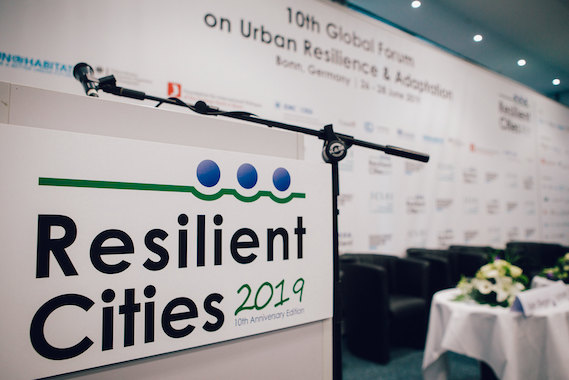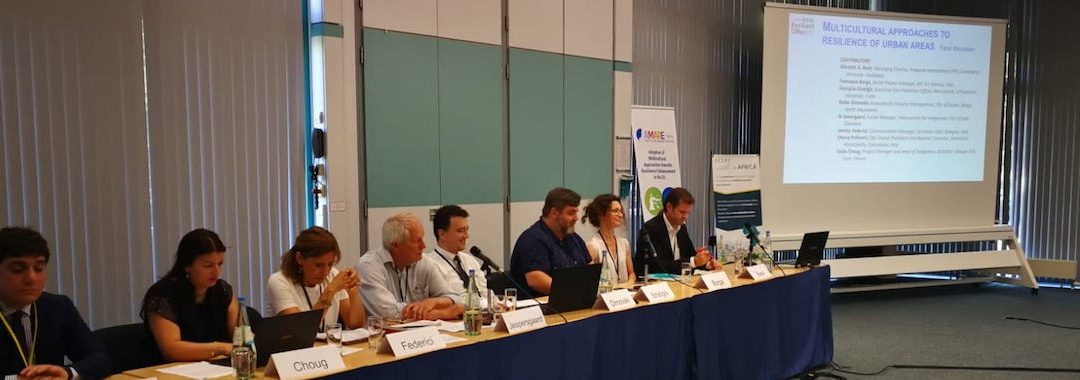Despite the summer heat wave crossing Europe, the AMARE-eu project pilot cities are working hard on the final definition of their action plans which they will start implementing by September.
Drawing inspiration from the insights shared during the training held in Bonn at the end of June, and from the examples and expertise shared by other participants to the ICLEI forum, pilot cities representatives returned home to finalize their action plans, only after providing their own contribution to the forum.
The AMARE-eu project contribution to the ICLEI forum was very much appreciated by the attendees of this key gathering among the representatives of the most resilient cities in the world and key stakeholders. The approach demanding the integration of multiculturalism in the theoretical and practical definition of resilience was received very positively and acknowledged as an important step to be taken to improve urban resilience more comprehensively.
The AMARE-eu partners’ and pilot cities representatives’ panel opened the second day of the Forum activities, presenting the cities and experts experiences on how to best integrate non-native population into resilience building and response preparedness.
The panel started with a presentation of the AMARE-eu objectives and activities by the project manager Francesca Borga, from EPC – European Project Consulting, who then left the floor to Georgios Stratigis, Executive Civil Protection Officer of the Municipality of Heraklion, who first highlighted the reasons behind introducing a multicultural approach to resilience, drawing on the example of the impact of a large tourist population in the emergency response management in Crete.
Ratko Dimovski, High associate for disaster management for the City of Skopje, Northern Macedonia, shed light on the challenge represented by the high presence of migrants and refugees on the administration of a city.
Marco Polimeni, City Council President and Regional Councilor for the Municipality of Catanzaro, presented an Italian experience of integrative resilience building: marginalized groups of native and non-native communities in Catanzaro are being engaged in order to bring relevant change and improvement in the city for all of its citizens.

Project partners contributed to the panel bringing their expertise in the field of resilience and multiculturalism in different European contexts.
Ib Jestergaard, Center Manager of Videnscenter for Integration of the City of Velje, presented the experience of his center in the integration of non-native communities and marginalized citizens included in the city’s social fabric through an inclusive urban planning process.
From Northern to Southern Europe, Sandra Federici, Communication Manager of Lai-momo Social Cooperative from Bologna, Italy, presented their contribution to the emergency response to the 2012 earthquake that hit the Emilia-Romagna region, highlighting the importance of the implementation of a multicultural approach in the preparedness and response phases of such, and any, emergency.
Bringing the case of the French context, Saida Choug, Project Manager and Head of the ASSFAM – Groupe SOS delegation, NGO based in Lyon, talked about the ways in which civil society can contribute to the building of urban resilience promoting the integration of marginalized communities, including non-natives.
Albrecht A. Beck, partner of the AMARE-eu project and Managing Director of Prepared International (PPI), a German organization based in Samerberg, working on emergency response all over the world, facilitated the panel and the interesting discussion that followed the presentations. Attendees and panelists had the chance to delve into the more concrete aspects to be kept into consideration in the phases of “calm” that precede and follow an emergency response. These, in fact, represent the best moments to work on the weaving of a social fabric and operative apparatus ready to react to an emergency keeping in mind all citizens, including non-native members of the community.

